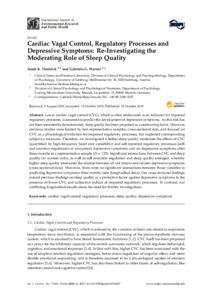|
Cardiac vagal control, regulatory processes and depressive symptoms: Re-investigating the moderating role of sleep quality
Danböck, Sarah K.
;
Werner, Gabriela G.
![[img]](https://madoc.bib.uni-mannheim.de/65290/1.hassmallThumbnailVersion/ijerph-16-04067-v2.pdf)  Vorschau |
|
PDF
ijerph-16-04067-v2.pdf
- Veröffentlichte Version
Download (1MB)
|
|
DOI:
|
https://doi.org/10.3390/ijerph16214067
|
|
URL:
|
https://www.mdpi.com/1660-4601/16/21/4067
|
|
Weitere URL:
|
https://www.ncbi.nlm.nih.gov/pmc/articles/PMC68625...
|
|
URN:
|
urn:nbn:de:bsz:180-madoc-652904
|
|
Dokumenttyp:
|
Zeitschriftenartikel
|
|
Erscheinungsjahr:
|
2019
|
|
Titel einer Zeitschrift oder einer Reihe:
|
International Journal of Environmental Research and Public Health : IJERPH
|
|
Band/Volume:
|
16
|
|
Heft/Issue:
|
21, Article 4067
|
|
Seitenbereich:
|
1-14
|
|
Ort der Veröffentlichung:
|
Basel
|
|
Verlag:
|
MDPI AG
|
|
ISSN:
|
1661-7827 , 1660-4601
|
|
Sprache der Veröffentlichung:
|
Englisch
|
|
Einrichtung:
|
Fakultät für Sozialwissenschaften > Klinische u. Biologische Psychologie u. Psychotherapie (Alpers 2010-)
|
|
Bereits vorhandene Lizenz:
|
 Creative Commons Namensnennung 4.0 International (CC BY 4.0) Creative Commons Namensnennung 4.0 International (CC BY 4.0)
|
|
Fachgebiet:
|
150 Psychologie
610 Medizin, Gesundheit
|
|
Freie Schlagwörter (Englisch):
|
cardiac vagal control , regulatory processes , sleep quality , depressive symptoms
|
|
Abstract:
|
Lower cardiac vagal control (CVC), which is often understood as an indicator for impaired regulatory processes, is assumed to predict the development of depressive symptoms. As this link has not been consistently demonstrated, sleep quality has been proposed as a moderating factor. However, previous studies were limited by non-representative samples, cross-sectional data, and focused on CVC as a physiological indicator for impaired regulatory processes, but neglected corresponding subjective measures. Therefore, we investigated whether sleep quality moderates the effects of CVC (quantified by high-frequency heart rate variability) and self-reported regulatory processes (self- and emotion-regulation) on concurrent depressive symptoms and on depressive symptoms after three months in a representative sample (N = 125). Significant interactions between CVC and sleep quality (in women only), as well as self-/emotion-regulation and sleep quality emerged, whereby higher sleep quality attenuated the relation between all risk factors and current depressive symptoms (cross-sectional data). However, there were no significant interactions between those variables in predicting depressive symptoms three months later (longitudinal data). Our cross-sectional findings extend previous findings on sleep quality as a protective factor against depressive symptoms in the presence of lower CVC and subjective indices of impaired regulatory processes. In contrast, our conflicting longitudinal results stress the need for further investigations.
|
 | Das Dokument wird vom Publikationsserver der Universitätsbibliothek Mannheim bereitgestellt. |
 | Dieser Datensatz wurde nicht während einer Tätigkeit an der Universität Mannheim veröffentlicht, dies ist eine Externe Publikation. |
 Suche Autoren in Suche Autoren in
Sie haben einen Fehler gefunden? Teilen Sie uns Ihren Korrekturwunsch bitte hier mit: E-Mail
Actions (login required)
 |
Eintrag anzeigen |
|
|
 ORCID: 0000-0001-9989-1146 ; Werner, Gabriela G.
ORCID: 0000-0001-9989-1146 ; Werner, Gabriela G.



 Creative Commons Namensnennung 4.0 International (CC BY 4.0)
Creative Commons Namensnennung 4.0 International (CC BY 4.0) Suche Autoren in
Suche Autoren in